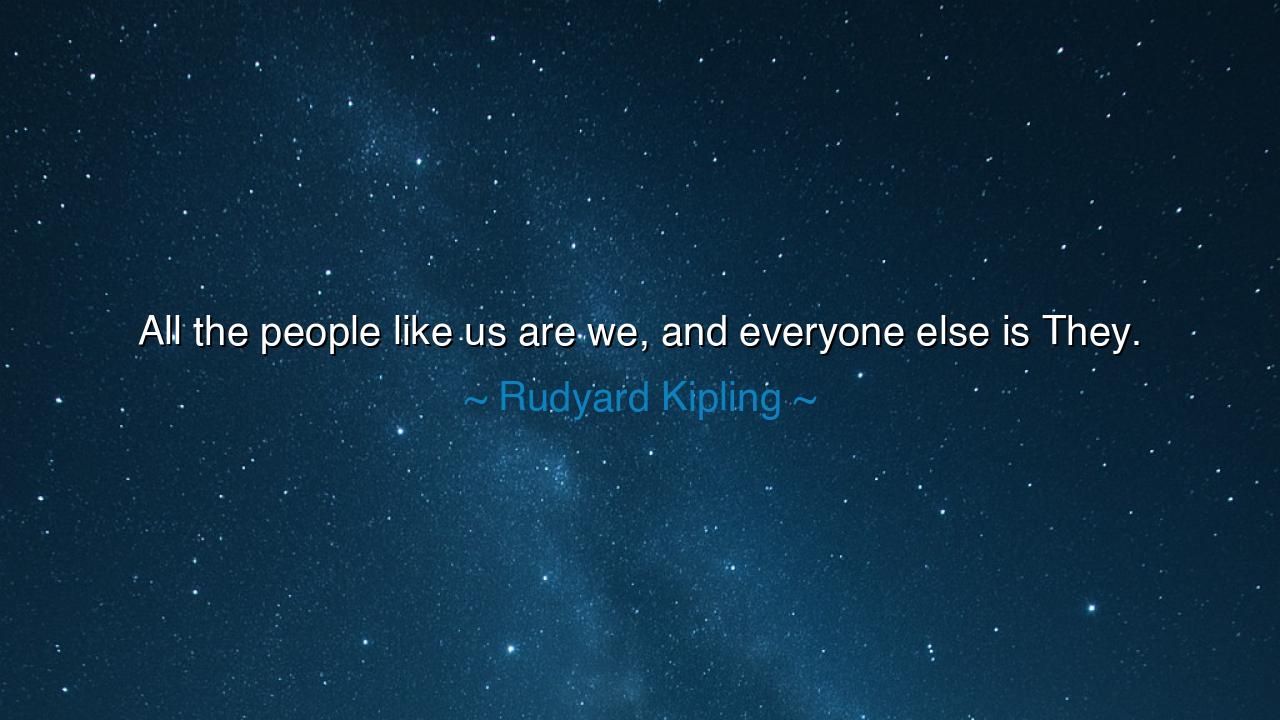
All the people like us are we, and everyone else is They.






The words of Rudyard Kipling—“All the people like us are we, and everyone else is They.”—cut through the ages like a mirror held to the soul of humanity. Beneath their apparent simplicity lies a profound truth about the tribal nature of mankind, the eternal tendency to divide the world into belonging and otherness. Kipling, a man who walked between nations and empires, understood better than most how swiftly the human heart draws its invisible boundaries. His words are not a celebration of separation, but a warning cloaked in observation: that the greatest struggle of civilization is not against nature, but against our own instinct to divide.
The origin of this quote lies in Kipling’s poem We and They, written during the height of the British Empire. Kipling, who lived among both colonizers and the colonized, witnessed firsthand the walls built by pride and prejudice. His lines describe how every tribe, every nation, sees itself as “we,” while others—those who speak differently, dress differently, worship differently—become “they.” The tone is deceptively playful, almost childlike, yet beneath the surface it reveals the ancient wound of human arrogance. Kipling exposes not just the political divisions of empire, but the deeper psychological hunger for belonging that drives humanity to build walls instead of bridges.
In his time, Kipling’s words resonated across a world obsessed with hierarchy—between East and West, rich and poor, ruler and subject. Yet his message endures because it speaks not of his century alone, but of every age. The instinct to create a “we” and a “they” is the root of both community and conflict. It gives us identity, yet blinds us to the shared soul within all beings. The same fire that warms the tribe can also burn the stranger. Thus, Kipling, who was often misunderstood as the poet of empire, here becomes its critic. He reminds us that the walls we build for protection become prisons for the spirit.
History abounds with examples of this division. Consider the story of the Civil Rights Movement in America. For centuries, one group called itself “we”—those deemed worthy of freedom, opportunity, and dignity—while others, the enslaved and the oppressed, were labeled “they.” Yet it was only when brave souls like Martin Luther King Jr. and Rosa Parks defied this false division that humanity’s vision began to heal. They revealed the illusion for what it was: a boundary drawn not by truth, but by fear. The victory of civil rights was not merely a political triumph, but a spiritual awakening—a reminder that the circle of “we” must forever expand until it includes all humankind.
Kipling’s insight is not confined to nations or races. It lives in every human heart. The worker who mocks the rich, the scholar who scorns the unlearned, the believer who shuns the unbeliever—all speak in the same ancient voice: “They are not like us.” Yet this mindset, though comforting, is the source of much of the world’s sorrow. For the moment we label others as “they,” we strip them of their humanity and lose a piece of our own. The wise among us see through this illusion. They know that the only true “we” is the one that embraces all—for beneath color, creed, and custom, the human spirit beats with the same pulse.
In the ancient world, this lesson was taught again and again. The philosophers of Greece spoke of cosmopolis, the universal city of humankind. The prophets of Israel called for justice “for the stranger within your gates.” The sages of the East spoke of the oneness of all souls. Across time, the wisest have known what Kipling hinted at with irony: that the great division of “we” and “they” is the illusion that must be broken if humanity is ever to be whole. For unity is not the absence of difference—it is the harmony of it, the music made when many notes blend without losing their voices.
So, my child, remember this teaching: beware the easy comfort of “we” and “they.” When you find yourself standing with your own kind, do not forget the unseen faces on the other side. Seek to understand before you judge, to listen before you speak, to welcome before you exclude. Build bridges of empathy where others build walls of fear. For each time you open your heart to the stranger, “they” become part of “we,” and the world grows a little more whole.
Thus, Kipling’s simple line becomes an eternal challenge. It asks us: will we remain tribes divided by difference, or will we become one people, bound by compassion? The answer lies not in kings or governments, but in each soul that dares to see through the illusion of separateness. For in the end, there is no “we” or “they”—there is only us.






AAdministratorAdministrator
Welcome, honored guests. Please leave a comment, we will respond soon